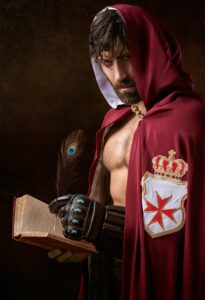
Author: Lucy May Lennox
Narrators: Duke DeFoix, Duchess DeFoix, Olivia Featherton, Earl Tyrone
Length: 14 hours 56 minutes
Publisher: Lucy May Lennox
Released: Oct. 10, 2020
Genre: Historical Fiction

London, 1735. Covent Garden offers a world of pleasures and diversions, even for a blind man. Tom Finch approaches life with boundless good cheer and resilience, whether he’s pursuing a musical career or pursuing women. And as for his blindness, to him it’s merely an inconvenience. Join Tom for a picaresque romp through high and low Georgian society among rakes, rovers, thieving whores and demi-reps, highway robbers, bigamists, and duelists, bisexual opera divas, castrati, mollies, and cross-dressers, lecherous aristocrats, and headstrong ladies. This meticulously researched, witty and lively tale overturns stereotypes about disability and revels in the spectacle and excitement of 18th century opera.


Lucy May Lennox loves immersing herself in various historical periods and imagining the lives of people who don't usually make it into the history books. A lifelong lover of classical and folk music, she has performed as a chorus member in operas and concerts in three countries, and once won first place in a sean nos (traditional Irish singing) contest. She lives in the beautiful Pacific Northwest USA with her husband and children.
Goodreads


Growing up in a family devoted to the performing arts, Duke started his acting career a little later than expected. Since then he has performed internationally on both stage and screen. He has voiced characters in animated series, features, and video games.
He enjoys working with his lovely Duchess on audiobooks whenever he can find time away from galloping his trusty white stallion across the windswept moors, rescuing beautiful, clever, and passionate ladies in distress, and fighting sabre wielding brigands on the high seas.
Website

Q&A with Author Lucy May Lennox
- Tell us about the process of turning your book into an audiobook.
- It happened on a whim! I was looking around at the Amazon publishing tools and saw the link for ACX. When I saw how easy it was to publish an audiobook, I thought I’d at least try auditioning producers and see how it went. Without really expecting much, I posted a sample. I was overwhelmed to get twenty auditions posted within a few days, most by very talented narrators. It was so gratifying to get so many positive comments from prospective narrators just based on the short sample I posted. Because the novel is about opera, the content really resonated with narrators who have a background in theater and singing. The whole process was so much fun right from the beginning.
- Was a possible audiobook recording something you were conscious of while writing?
- Not at all, to my regret. I might have phrased some things differently after hearing it read aloud. I also would have changed some aspects of the music to make it easier to integrate. For my future novels, it’s definitely something I’m keeping in mind.
- How did you select your narrator?
- It really felt like fate! When I discovered the ACX website, the first thing I did, even before posting a call for auditions, was to search for narrators who specialize in a standard BBC accent. The Duke and Duchess DeFoix of Her Grace Reads Studios were the first search result, and I fell in love with their samples. Their voices seemed perfect for my characters. But when I looked at their website, they had so many titles forthcoming, I was certain they would be too busy. Two days after I posted my call for auditions, the Duchess sent me a message saying, “Don’t accept any other offer before you hear our audition.” I was amazed and delighted that they were so keen on this project. Right from the start we seemed to completely understand each other. Then they volunteered to actually sing the songs, not just read the words, and even to engage an opera singer. How could I go with anyone else?
- How closely did you work with your narrator before and during the recording process? Did you give them any pronunciation tips or special insight into the characters?
- I gave Her Grace Reads Studios the entire book to read before we agreed on a contract, so they would know the content. The Duke read it all in a day—it’s over 400 pages! I can’t believe how fast he reads. Before recording, I sent them character notes saying what type of accent each major character should have, high class or low class or something in between. I made a pronunciation guide and glossary for all the foreign words, slang terms, and archaic words. It was a long list! I was particularly concerned about the one line of Gaelic poetry, but the Duke handled it flawlessly. For the music, I made a list of all the songs, which character sings each one, and a link to YouTube. It’s amazing that they learned all the music so quickly.
- Only one of the songs didn’t have an audio reference: “Among our own selves we’ll be free,” which is sung in the molly-house. I found references to it in histories of gay culture in the 18th century, but no music. Her Grace Reads Studios hired composer Varya Rubin to write music so it could be sung in the audiobook. It sounds authentic, and I’m so grateful to them for bringing this bit of gay history to life.
- Were there any real life inspirations behind your writing?
- A lot of my experience with backstage drama as a regular chorus member in two semi-professional opera companies found its way into the story. The scene where a character angrily throws her shoe at her dressing-room door is based on a real incident, as is the rivalry between two women for a young feckless tenor.
- I’m lucky enough to have visited London often, including while I was writing the novel, and walked around Covent Garden and the houses on Maiden Lane. It really helped to get a concrete sense for the setting. All the operas and composers are real, and I drew inspiration from many real events of the era, including riots in the theater over ticket prices.
- What about real life inspirations for the characters?
- There were quite a few blind men in the 18th century who were highly accomplished in their professions: Sir John Fielding, composers John Stanley and Turlough O’Carolan, among others. John Stanley conducted several oratorios for Handel, learning all the notes by ear, as Tom does. I borrowed the scene of Tom recognizing a woman by holding her hand as she steps into a boat from the life of Carolan. His drinking and flirting with women also come from Carolan, at least in part. I borrowed Tom’s unusual method of cane use and echolocation from the real life of James Holman.
- At the beginning of the novel, Tom is composing a ballad called “London.” The real composer is Henry Carey, who like Tom was the illegitimate son of a nobleman, and made his living composing both operas and ballads. His life was a model for a character who is educated but not upper class, and who alternates between high and low society.
- Many of the secondary characters are based on real people of the era: Betsy Careless, Sally Salisbury, Princess Seraphina, Lord Mordington, Farinelli, Anna Maria Strada, Veracini, among others.
- Is there a particular part of this story that you feel is more resonating in the audiobook performance than in the book format?
- The way the Duke voices Tom’s dialog is exactly how I heard it in my head as I was writing. I’m so pleased with how perfectly he interprets the lines. I particularly love the way he says “Whaaat?” whenever Tom is surprised by something. It’s so lively and expressive.
- I’m in awe of how amazingly well Olivia Featherton brings the character of Sal to life. Every line of dialog from her is a delight, and I only wish there was more. I admit when I first began writing Sal, I felt a bit intimidated about getting the slang right, so I cheated and used a lot of indirect narration. I got more confident writing her dialog as I went along, but now I wish I had many more lines for Sal. I feel like she really steals the show, much more in the audiobook than in print.
- Of course it adds a whole other dimension to have the music in the audiobook. I could hear the music in my head as I was writing, but most readers are probably not familiar with all of it. It’s so exciting to actually hear Tom sing the songs he is composing, or hear Tess sing an aria. The music at the start and close of each chapter adds so much as well. I love how the selection shifts to represent the mood of each chapter—it sets the scene so well.
- If you had the power to time travel, would you use it? If yes, when and where would you go?
- Obviously, I’d love to see London of 1735 in real life, but not to stay. I would not want to experience the sexism and racism of that period in person, not to mention the filth and disease. I’m sure if I ended up there, I would immediately die of smallpox. But I’m so curious to see it briefly, just to see and hear how people actually talked and dressed, and to hear what the music sounded like. There are attempts to recreate baroque music using period instruments and tuning, but we don’t know for sure if it sounded like we imagine.
- Have any of your characters ever appeared in your dreams?
- Yes! Actually the character of Tom first came to me in a dream—I saw a tall, thin blind man with a walking stick, wearing 18th century clothing and a tricorne hat. I immediately had such a clear sense of who he was, and I knew I had to create a novel for him to inhabit.
- What's your favorite opera?
- To be honest, Handel’s operas are not my favorite. By far my favorite composer is Mozart. I love all his operas, especially The Marriage of Figaro. Every note is perfect; it’s funny but also with incredible generosity of spirit and love for the human flaws of the characters. I considered using Mozart’s operas in the novel instead, but I don’t know anything about Vienna, while London is a very familiar setting to me, and I wanted to keep the time period to the early 18th century, to avoid the political turmoil that came later. Using that setting meant using Handel’s operas as the backdrop. But in terms of tone, I tried to capture the blend of comedy and deep compassion of The Marriage of Figaro. I still listen to it over and over again.
- What’s next for you?
- I’m working on another historical fiction novel, this time set in Japan in 1825, during the Edo period. It’s almost finished; I hope to publish in the next month or two. Look for it on my Amazon page! I will definitely look into turning it into an audiobook as well.

- Tom Finch: Composer of broadside ballads, music master and conductor in the opera houses around Covent Garden, London. Illegitimate son of a poxy earl and a commoner, raised by his uncle who gave him a thorough education in music, drinking, and seducing women. Blind since early childhood but independent and self-reliant, he gets about using echolocation, a walking stick, and a mental map of Covent Garden. Unflaggingly cheerful, good-natured and optimistic, given to libertinism and wantonness but finds his rake’s progress continually interrupted by his musical talent and innate decency…
- age: 30
- height: 6 feet
- appearance: very thin and tall, with sandy brown hair worn long and tied in a queue, always dressed stylishly in a surcoat, brocade waistcoat, white hose, and tricorne hat
- Tess Turnbridge: Aspiring opera diva with a burning ambition to become prima donna of the Theatre Royal. Daughter of a famous Italian soprano and an English composer. Recently returned to London, having left Naples under somewhat scandalous circumstances. Kind-hearted and level-headed, but not above giving into temptation, from either men or women…
- age: 25
- height: 5 feet 3 inches
- appearance: slender but very feminine, with dark brown curls and dark eyes, usually dressed in a robe a la francaise
- Sally Salisbury: Infamous whore, part time pickpocket, shoplifter, and house breaker, with occasional forays into forgery and highway robbery. Fearless, fun-loving and with no pretense to polite manners, she lets most men know she’s only after their money. But she always treats Tom as an equal and without a trace of pity, and he can’t help but love her for it, even though he knows he shouldn’t trust her…
- age: maybe 25 or so? She’s not sure.
- height: 5 feet 7 inches
- appearance: tall and angular, not very feminine, lank blonde hair and blue eyes, sometimes dresses in men’s clothing
- Jem Castleton: Tom’s crony and amanuensis, an unrepentant rogue, often found lushing it with the whores around Covent Garden, but also not averse to visiting a molly house.
- Lady Sarah Grey: Tom’s dowager aunt and chief benefactor. A keen patron of the opera, she encourages his career but he often finds her aid is not without some emotional price.
- Captain Philip Moorehouse, RN: Tom’s half-brother, another of the earl’s many illegitimate sons. Post captain without a ship. Closeted gay man in a relationship with a Marine captain.
- Charlotte Carstone: Tom’s half-sister, one of the cast-off daughters of the earl’s first wife. Comes to Tom for aid in fleeing her abusive husband.

Click here to view the full tour schedule!
Plugging you into the audio community since 2016.








Thanks very much for hosting me!
ReplyDelete